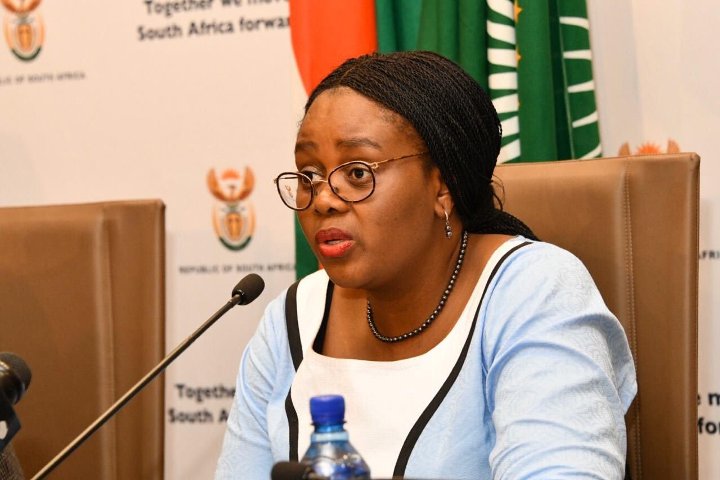Kubayi Accepts Child Protection Memorandums, Calls for Legal Reform and Vigilance
The Minister acknowledged the partnership between government and civil society in bringing children's rights to the forefront.

- Country:
- South Africa
As South Africa commemorates Child Protection Week 2025, Minister of Justice and Constitutional Development Mmamoloko Kubayi joined hands with civil society to spotlight the urgent need to protect the nation’s children. On Sunday, the Minister accepted memorandums from multiple child protection organisations at the Constitutional Court, where hundreds gathered for a symbolic children’s march demanding justice, accountability, and systemic change.
The march, co-hosted by the Gauteng Department of Social Development, comes in the wake of the recent sentencing of three individuals in the human trafficking case of six-year-old Joshlin Smith, whose disappearance and exploitation ignited national outrage. Participants in the march—children, caregivers, activists, and officials—carried signs, sang freedom songs, and chanted slogans demanding stronger child protection laws and tougher penalties for abusers.
“Children Are Aware—and They Are Speaking Up”
Addressing the emotional crowd, Minister Kubayi praised the courage and consciousness of the young participants.
“It is heartening to see children who are aware of their environment and willing to speak up about what is right and wrong,” she said. “This generation is not silent, and that gives us hope.”
The Minister acknowledged the partnership between government and civil society in bringing children's rights to the forefront. She particularly commended the non-governmental organisations (NGOs) and community workers who have remained relentless in their advocacy for safer communities and more responsive institutions.
A New, Troubling Trend
Minister Kubayi raised a sobering concern: a shift in child abuse patterns, with growing reports of mothers themselves being complicit in the exploitation of their children, including cases of human trafficking, abuse, and neglect.
“Ordinarily, we worried about fathers molesting or abusing children and mothers seeking help. Now, we’re seeing new patterns where mothers are perpetrators—a deeply disturbing trend that demands urgent societal introspection,” Kubayi stated.
She emphasized that these developments challenge traditional assumptions about family dynamics and safety, and they call for updated protective strategies that account for all possible threats—regardless of who the perpetrator is.
Legislative Reform on the Horizon
In response to these shifting realities, Kubayi revealed that the government is actively reviewing the Criminal Procedure Act, the Parole Act, and related legislation to ensure that they are suited for the modern context of gender-based violence (GBV) and child exploitation.
“We are reviewing laws that were developed at a time when the scale of GBV and child abuse was not as dire. These laws must evolve to meet today’s urgent needs,” she said.
While reiterating that government does not support the death penalty, Kubayi strongly backed life sentences without parole for the most serious offenders.
“Rehabilitation must always be weighed against the trauma and permanent scars inflicted on victims. Society’s duty is first to protect the vulnerable.”
Measuring Justice System Performance
Kubayi also spoke about new monitoring systems being used to track the criminal justice process in real time. These include:
-
The number of GBV and child abuse cases opened daily,
-
The proportion that proceeds to court, and
-
The rate of successful prosecution.
She explained that this data-driven approach helps the Department of Justice identify gaps—whether in police procedures, prosecutorial decisions, or court processes—and respond strategically to close them.
The Role of the South African Law Reform Commission
In February 2025, the South African Law Reform Commission (SALRC) released discussion papers on the Criminal Procedure Act of 1977, inviting public participation. The review seeks to overhaul sections of the law that are no longer effective, particularly those dealing with arrest procedures, bail provisions, alternative dispute resolution, and victim involvement in trials.
Experts believe this reform is long overdue, especially in cases involving vulnerable groups such as women and children, where the system often leans in favor of procedural technicalities over victim welfare.
A Call for Unified Action
Minister Kubayi highlighted that while the justice system handles prosecution, lasting impact will only be achieved through community collaboration and social services integration.
“Social Development plays a vital role in family support, rehabilitation, and community healing. It’s not just about locking people up—it’s about preventing the crimes in the first place,” she said.
She called on schools, religious groups, traditional leaders, and community-based organisations to join hands in forming a protective circle around every child.
Marchers Demand Action, Not Promises
Several children took to the podium to read messages and personal reflections. One young girl from Soweto stated:
“We want to grow up in a country where we are safe at home, safe at school, and safe on the streets. We want adults to listen to us—not only when something bad happens.”
The memorandums delivered to Minister Kubayi contained specific demands, including:
-
Specialized courts for crimes against children
-
Harsher penalties for trafficking and sexual abuse
-
Mandatory counselling services for affected children and families
-
Increased school-based awareness and intervention programs
Looking Ahead
While the march was symbolic, its message was clear: the country’s children are no longer voiceless, and they expect leadership that listens and acts. With legislative reform on the table and growing public scrutiny, South Africa stands at a pivotal moment in its child protection journey.
Minister Kubayi closed her remarks with a plea for sustained engagement:
“Let us work together—not just during Child Protection Week, but every day—to root out abuse and build a future where our children can live, learn, and dream safely.”










